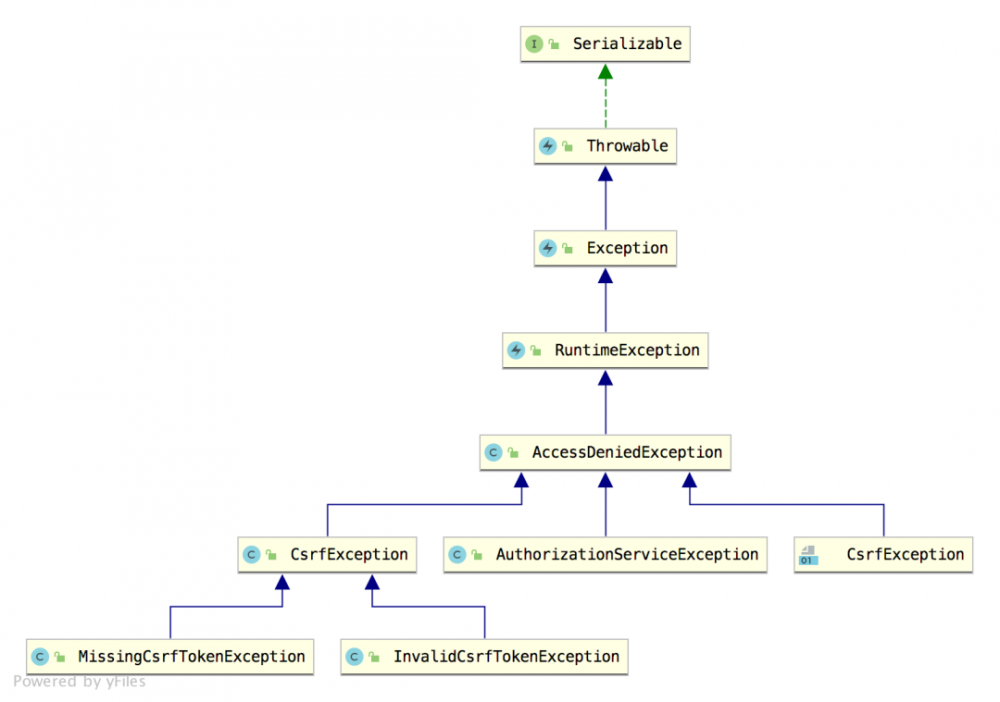一文搞定 Spring Security 异常处理机制!
松哥原创的 Spring Boot 视频教程已经杀青,感兴趣的小伙伴戳这里--> Spring Boot+Vue+微人事视频教程
今天来和小伙伴们聊一聊 Spring Security 中的异常处理机制。
在 Spring Security 的过滤器链中,ExceptionTranslationFilter 过滤器专门用来处理异常,在 ExceptionTranslationFilter 中,我们可以看到,异常被分为了两大类:认证异常和授权异常,两种异常分别由不同的回调函数来处理,今天松哥就来和大家分享一下这里的条条框框。
1.异常分类
Spring Security 中的异常可以分为两大类,一种是认证异常,一种是授权异常。
认证异常就是 AuthenticationException,它有众多的实现类:

可以看到,这里的异常实现类还是蛮多的,都是都是认证相关的异常,也就是登录失败的异常。这些异常,有的松哥在之前的文章中都和大家介绍过了,例如下面这段代码(节选自: Spring Security 做前后端分离,咱就别做页面跳转了!统统 JSON 交互 ):
resp.setContentType("application/json;charset=utf-8");
PrintWriter out = resp.getWriter();
RespBean respBean = RespBean.error(e.getMessage());
if (e instanceof LockedException) {
respBean.setMsg("账户被锁定,请联系管理员!");
} else if (e instanceof CredentialsExpiredException) {
respBean.setMsg("密码过期,请联系管理员!");
} else if (e instanceof AccountExpiredException) {
respBean.setMsg("账户过期,请联系管理员!");
} else if (e instanceof DisabledException) {
respBean.setMsg("账户被禁用,请联系管理员!");
} else if (e instanceof BadCredentialsException) {
respBean.setMsg("用户名或者密码输入错误,请重新输入!");
}
out.write(new ObjectMapper().writeValueAsString(respBean));
out.flush();
out.close();
另一类就是授权异常 AccessDeniedException,授权异常的实现类比较少,因为授权失败的可能原因比较少。

2.ExceptionTranslationFilter
ExceptionTranslationFilter 是 Spring Security 中专门负责处理异常的过滤器,默认情况下,这个过滤器已经被自动加载到过滤器链中。
有的小伙伴可能不清楚是怎么被加载的,我这里和大家稍微说一下。
当我们使用 Spring Security 的时候,如果需要自定义实现逻辑,都是继承自 WebSecurityConfigurerAdapter 进行扩展,WebSecurityConfigurerAdapter 中本身就进行了一部分的初始化操作,我们来看下它里边 HttpSecurity 的初始化过程:
protected final HttpSecurity getHttp() throws Exception {
if (http != null) {
return http;
}
AuthenticationEventPublisher eventPublisher = getAuthenticationEventPublisher();
localConfigureAuthenticationBldr.authenticationEventPublisher(eventPublisher);
AuthenticationManager authenticationManager = authenticationManager();
authenticationBuilder.parentAuthenticationManager(authenticationManager);
Map<Class<?>, Object> sharedObjects = createSharedObjects();
http = new HttpSecurity(objectPostProcessor, authenticationBuilder,
sharedObjects);
if (!disableDefaults) {
http
.csrf().and()
.addFilter(new WebAsyncManagerIntegrationFilter())
.exceptionHandling().and()
.headers().and()
.sessionManagement().and()
.securityContext().and()
.requestCache().and()
.anonymous().and()
.servletApi().and()
.apply(new DefaultLoginPageConfigurer<>()).and()
.logout();
ClassLoader classLoader = this.context.getClassLoader();
List<AbstractHttpConfigurer> defaultHttpConfigurers =
SpringFactoriesLoader.loadFactories(AbstractHttpConfigurer.class, classLoader);
for (AbstractHttpConfigurer configurer : defaultHttpConfigurers) {
http.apply(configurer);
}
}
configure(http);
return http;
}
可以看到,在 getHttp 方法的最后,调用了 configure(http); ,我们在使用 Spring Security 时,自定义配置类继承自 WebSecurityConfigurerAdapter 并重写的 configure(HttpSecurity http) 方法就是在这里调用的,换句话说,当我们去配置 HttpSecurity 时,其实它已经完成了一波初始化了。
在默认的 HttpSecurity 初始化的过程中,调用了 exceptionHandling 方法,这个方法会将 ExceptionHandlingConfigurer 配置进来,最终调用 ExceptionHandlingConfigurer#configure 方法将 ExceptionTranslationFilter 添加到 Spring Security 过滤器链中。
我们来看下 ExceptionHandlingConfigurer#configure 方法源码:
@Override
public void configure(H http) {
AuthenticationEntryPoint entryPoint = getAuthenticationEntryPoint(http);
ExceptionTranslationFilter exceptionTranslationFilter = new ExceptionTranslationFilter(
entryPoint, getRequestCache(http));
AccessDeniedHandler deniedHandler = getAccessDeniedHandler(http);
exceptionTranslationFilter.setAccessDeniedHandler(deniedHandler);
exceptionTranslationFilter = postProcess(exceptionTranslationFilter);
http.addFilter(exceptionTranslationFilter);
}
可以看到,这里构造了两个对象传入到 ExceptionTranslationFilter 中:
-
AuthenticationEntryPoint 这个用来处理认证异常。
-
AccessDeniedHandler 这个用来处理授权异常。
具体的处理逻辑则在 ExceptionTranslationFilter 中,我们来看一下:
public class ExceptionTranslationFilter extends GenericFilterBean {
public ExceptionTranslationFilter(AuthenticationEntryPoint authenticationEntryPoint,
RequestCache requestCache) {
this.authenticationEntryPoint = authenticationEntryPoint;
this.requestCache = requestCache;
}
public void doFilter(ServletRequest req, ServletResponse res, FilterChain chain)
throws IOException, ServletException {
HttpServletRequest request = (HttpServletRequest) req;
HttpServletResponse response = (HttpServletResponse) res;
try {
chain.doFilter(request, response);
}
catch (IOException ex) {
throw ex;
}
catch (Exception ex) {
Throwable[] causeChain = throwableAnalyzer.determineCauseChain(ex);
RuntimeException ase = (AuthenticationException) throwableAnalyzer
.getFirstThrowableOfType(AuthenticationException.class, causeChain);
if (ase == null) {
ase = (AccessDeniedException) throwableAnalyzer.getFirstThrowableOfType(
AccessDeniedException.class, causeChain);
}
if (ase != null) {
if (response.isCommitted()) {
throw new ServletException("Unable to handle the Spring Security Exception because the response is already committed.", ex);
}
handleSpringSecurityException(request, response, chain, ase);
}
else {
if (ex instanceof ServletException) {
throw (ServletException) ex;
}
else if (ex instanceof RuntimeException) {
throw (RuntimeException) ex;
}
throw new RuntimeException(ex);
}
}
}
private void handleSpringSecurityException(HttpServletRequest request,
HttpServletResponse response, FilterChain chain, RuntimeException exception)
throws IOException, ServletException {
if (exception instanceof AuthenticationException) {
sendStartAuthentication(request, response, chain,
(AuthenticationException) exception);
}
else if (exception instanceof AccessDeniedException) {
Authentication authentication = SecurityContextHolder.getContext().getAuthentication();
if (authenticationTrustResolver.isAnonymous(authentication) || authenticationTrustResolver.isRememberMe(authentication)) {
sendStartAuthentication(
request,
response,
chain,
new InsufficientAuthenticationException(
messages.getMessage(
"ExceptionTranslationFilter.insufficientAuthentication",
"Full authentication is required to access this resource")));
}
else {
accessDeniedHandler.handle(request, response,
(AccessDeniedException) exception);
}
}
}
protected void sendStartAuthentication(HttpServletRequest request,
HttpServletResponse response, FilterChain chain,
AuthenticationException reason) throws ServletException, IOException {
SecurityContextHolder.getContext().setAuthentication(null);
requestCache.saveRequest(request, response);
logger.debug("Calling Authentication entry point.");
authenticationEntryPoint.commence(request, response, reason);
}
}
ExceptionTranslationFilter 的源码比较长,我这里列出来核心的部分和大家分析:
-
过滤器最核心的当然是 doFilter 方法,我们就从 doFilter 方法看起。这里的 doFilter 方法中过滤器链继续向下执行,ExceptionTranslationFilter 处于 Spring Security 过滤器链的倒数第二个,最后一个是 FilterSecurityInterceptor,FilterSecurityInterceptor 专门处理授权问题,在处理授权问题时,就会发现用户未登录、未授权等,进而抛出异常,抛出的异常,最终会被 ExceptionTranslationFilter#doFilter 方法捕获。
-
当捕获到异常之后,接下来通过调用
throwableAnalyzer.getFirstThrowableOfType方法来判断是认证异常还是授权异常,判断出异常类型之后,进入到 handleSpringSecurityException 方法进行处理;如果不是 Spring Security 中的异常类型,则走 ServletException 异常类型的处理逻辑。 -
进入到 handleSpringSecurityException 方法之后,还是根据异常类型判断,如果是认证相关的异常,就走 sendStartAuthentication 方法,最终被 authenticationEntryPoint.commence 方法处理;如果是授权相关的异常,就走 accessDeniedHandler.handle 方法进行处理。
AuthenticationEntryPoint 的默认实现类是 LoginUrlAuthenticationEntryPoint,因此默认的认证异常处理逻辑就是 LoginUrlAuthenticationEntryPoint#commence 方法,如下:
public void commence(HttpServletRequest request, HttpServletResponse response,
AuthenticationException authException) throws IOException, ServletException {
String redirectUrl = null;
if (useForward) {
if (forceHttps && "http".equals(request.getScheme())) {
redirectUrl = buildHttpsRedirectUrlForRequest(request);
}
if (redirectUrl == null) {
String loginForm = determineUrlToUseForThisRequest(request, response,
authException);
RequestDispatcher dispatcher = request.getRequestDispatcher(loginForm);
dispatcher.forward(request, response);
return;
}
}
else {
redirectUrl = buildRedirectUrlToLoginPage(request, response, authException);
}
redirectStrategy.sendRedirect(request, response, redirectUrl);
}
可以看到,就是重定向,重定向到登录页面(即当我们未登录就去访问一个需要登录才能访问的资源时,会自动重定向到登录页面)。
AccessDeniedHandler 的默认实现类则是 AccessDeniedHandlerImpl,所以授权异常默认是在 AccessDeniedHandlerImpl#handle 方法中处理的:
public void handle(HttpServletRequest request, HttpServletResponse response,
AccessDeniedException accessDeniedException) throws IOException,
ServletException {
if (!response.isCommitted()) {
if (errorPage != null) {
request.setAttribute(WebAttributes.ACCESS_DENIED_403,
accessDeniedException);
response.setStatus(HttpStatus.FORBIDDEN.value());
RequestDispatcher dispatcher = request.getRequestDispatcher(errorPage);
dispatcher.forward(request, response);
}
else {
response.sendError(HttpStatus.FORBIDDEN.value(),
HttpStatus.FORBIDDEN.getReasonPhrase());
}
}
}
可以看到,这里就是服务端跳转返回 403。
3.自定义处理
前面和大家介绍了 Spring Security 中默认的处理逻辑,实际开发中,我们可以需要做一些调整,很简单,在 exceptionHandling 上进行配置即可。
首先自定义认证异常处理类和授权异常处理类:
@Component
public class MyAuthenticationEntryPoint implements AuthenticationEntryPoint {
@Override
public void commence(HttpServletRequest request, HttpServletResponse response, AuthenticationException authException) throws IOException, ServletException {
response.getWriter().write("login failed:" + authException.getMessage());
}
}
@Component
public class MyAccessDeniedHandler implements AccessDeniedHandler {
@Override
public void handle(HttpServletRequest request, HttpServletResponse response, AccessDeniedException accessDeniedException) throws IOException, ServletException {
response.setStatus(403);
response.getWriter().write("Forbidden:" + accessDeniedException.getMessage());
}
}
然后在 SecurityConfig 中进行配置,如下:
@Configuration
public class SecurityConfig extends WebSecurityConfigurerAdapter {
@Override
protected void configure(HttpSecurity http) throws Exception {
http.authorizeRequests()
...
...
.and()
.exceptionHandling()
.authenticationEntryPoint(myAuthenticationEntryPoint)
.accessDeniedHandler(myAccessDeniedHandler)
.and()
...
...
}
}
配置完成后,重启项目,认证异常和授权异常就会走我们自定义的逻辑了。
4.小结
好啦,今天主要和小伙伴们分享了 Spring Security 中的异常处理机制,感兴趣的小伙伴可以试一试哦~
文中代码下载地址:https://github.com/lenve/spring-security-samples
小伙伴们如果觉得有收获,记得点个在看鼓励下松哥哦~
今日干货

刚刚发表
查看: 66666 回复:666
公众号后台回复 ssm,免费获取松哥纯手敲的 SSM 框架学习干货。
- 本文标签: GitHub 锁 Security 认证 Spring Security 配置 App http rmi cache https API tk 开发 message 源码 Spring Boot map CTO src logo mapper git 管理 equals list 免费 ssl id cat CEO build ORM servlet IDE session value 下载 web 服务端 tar 代码 final bean bug UI json 文章 spring IO js
- 版权声明: 本文为互联网转载文章,出处已在文章中说明(部分除外)。如果侵权,请联系本站长删除,谢谢。
- 本文海报: 生成海报一 生成海报二











![[HBLOG]公众号](https://www.liuhaihua.cn/img/qrcode_gzh.jpg)

